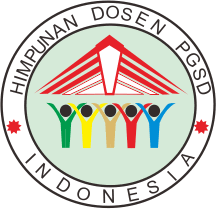Implementasi permainan tradisional engkek-engkek (engklek) sebagai sarana pengembangan keterampilan sosial peserta didik di sekolah dasar
Abstract
This study aims to analyze the implementation of the traditional game of engkek-engkek (engklek) in developing the social skills of elementary school students. This study was conducted at CLC Prolific, Sabah, Malaysia. The research method used was a qualitative case study approach. Data collection techniques used were questionnaires, observation, and interviews. The results showed that the traditional game of engkek-engkek (engklek) can help develop students' social skills because it contains many social skill values. The results showed that the social skills of third-grade students through the implementation of the traditional game of engkek-engkek (engklek) were categorized as "Good" with a total average score of 75.98%. The highest social skill aspect was cooperation with an average percentage of 93.91%. The lowest social skill aspect was self-control with an average percentage of 57.76%. The conclusion of this study is that the implementation of the traditional game of engkek-engkek (engklek) can develop the social skills of elementary school students.
Keywords
References
R. Andini, S. Marmoah, and Suharno, “Analisis keterampilan sosial peserta didik dalam pembelajaran tematik berbasis model cooperative learning kelas V sekolah dasar,” Didakt. Dwija Indria, vol. 11, no. 1, 2023, doi: 10.20961/ddi.v8i01.39777. [2] A. N. Rizky, S. Istiyati, and S. Kamsiyati, “Analisis keterampilan sosial peserta didik dalam pembelajaran IPS kelas V sekolah dasar,” Didakt. Dwija Indria, vol. 10, no. 2, pp. 52–57, 2023, doi: 10.20961/ddi.v8i01.39777. [3] E. E. Saputra, “Pengembangan Keterampilan Sosial Siswa Sekolah Dasar dalam Konteks Pendidikan Multikultural Pada Mata Pelajaran IPS,” vol. 2, no. 3, pp. 158–164, 2024, doi: 10.70115/semesta.v2i3.175. [4] H. Sadiah, M. Swandhina, and S. N. Rochmah, “Upaya Meningkatkan Keterampilan Sosial Anak Usia Dini Melalui Permainan Tradisional Di Raudhatul Athfal,” J. PIAUD, vol. 2, no. 1, pp. 58–68, 2021. [5] D. Lestariningsih, B. H. Cahyani, and A. F. Nisa, “Penerapan Permainan Tradisional Bakiak Dan Gobag Sodor UntukMenstimulus Keterampilan Sosial Siswa,” J. Perseda, vol. 7, no. 1, pp. 85–96, 2024. [6] W. Lestari and N. Siregar, “Peranan Permainan Tradisional Engklek Dalam Mengembangkan Keterampilan Sosial Anak Usia Sekolah Dasar Di Desa Hamparan Perak,” Sch. Educ. J. Pgsd Fip Unimed, vol. 7, no. 3, pp. 305–311, 2017, doi: 10.24114/sejpgsd.v7i3.9253. [7] Y. Suryani, I. Zultiar, and A. Munajat, “Meningkatkan Kemampuan Sosial Emosional Anak Usia 5-6 Tahun Melalui Permainan Tradisional Engklek di Paud Calakan : Jurnal Sastra , Bahasa , dan Budaya,” CALAKAN J. Sastra, Bahasa, dan Budaya, vol. 1, no. 1, pp. 179–189, 2025. [8] M. Najiah and U. Jamaludi, “Nilai Pendidikan Dalam Permainan Tradisional Engklek,” Ling. Rima J. Pendidik. Bhs. dan Sastra Indones., vol. 12, no. 1, p. 101, 2023, doi: 10.31000/lgrm.v12i1.8143. [9] I. R. W. Atmojo, M. Matsuri, C. Chumdari, F. P. Adi, R. Ardiansyah, and D. Y. Saputri, “Pelatihan Integrasi Permainan Tradisional Dalam Pembelajaran Bagi Guru Sekolah Dasar Indonesia Bangkok,” Didakt. Dwija Indria , vol. 12, no. 4, pp. 310–316, 2022, [Online]. Available: https://jurnal.uns.ac.id/JDDI/article/view/91712%0Ahttps://jurnal.uns.ac.id/JDDI/article/download/91712/46355. [10] N. A. Lumbantobing and A. Safitri, “Implementasi Permainan Tradisional untuk Meningkatkan Intraksi Sosial dan Minat Belajar Peserta Didik Kelas IV SD Negeri 200118 Sadabuan,” vol. 2, no. 2, pp. 823–828, 2024. [11] N. Rut, R. L. Gaol, A. R. Abi, and P. Silaban, “Pengaruh Permainan Tradisional Terhadap Keterampilan Sosial Anak Sd,” J. Educ. FKIP UNMA, vol. 6, no. 2, pp. 449–455, 2020, doi: 10.31949/educatio.v6i2.568. [12] E. Desmariani, T. C. Kusuma, and F. M. Yanti, “Permainan Tradisional Sonlah/Engklek untuk Peningkatan Sosial Emosional Anak Usia Dini,” J. Ris. Pendidik. Dasar dan Karakter, vol. 3, no. No.1, pp. 16–25, 2021. [13] F. Riadi and T. Lestari, “Efektivitas Permainan Tradisional Pada Perkembangan Sosial Siswa Sekolah Dasar di Era Digital,” J. Kaji. Pendidik. Dasar, vol. 6, no. 2, pp. 122–129, 2017. [14] A. F. Gresham and S. N. Elliott, “Social Skills Improvement System (SSIS) Rating Scales,” no. C, p. 3400, 2007. [15] N. Harahap, Penelitian Kualitatif, vol. 11, no. 1. 2019. [16] Sugiyono, Metode Penelitian Kualitatif Untuk penelitian yang bersifat: eksploratif, enterpretif, interaktif, dan konstruktif, 3rd ed. Bandung: ALFABETA, 2024. [17] F. M. Gresham, S. N. Elliott, M. J. Vance, and C. R. Cook, “Comparability of the Social Skills Rating System to the Social Skills Improvement System: Content and Psychometric Comparisons Across Elementary and Secondary Age Levels,” Sch. Psychol. Q., vol. 26, no. 1, pp. 27–44, 2011, doi: 10.1037/a0022662.
Refbacks
- There are currently no refbacks.



